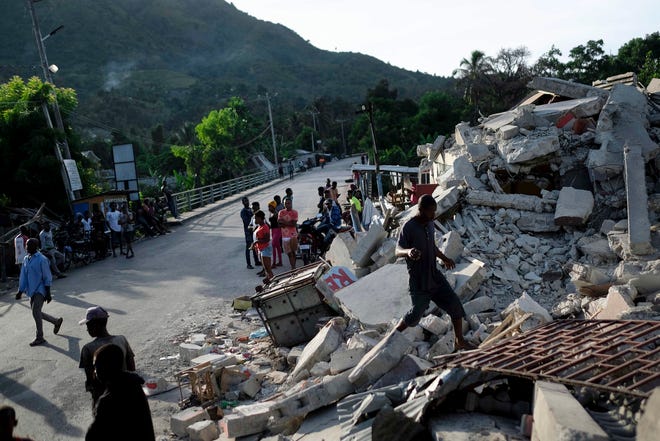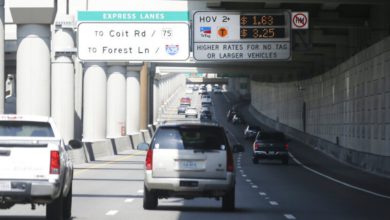
- Over 7,000 homes were destroyed in the quake. and another 5,000 were damaged.
- Some areas could see up to 15 inches of rain.
- The quake was most destructive in the southern part of the nation.
Thousands of Haitians scrambled to find shelter Monday after a 7.2 magnitude earthquake took nearly 1,500 lives over the weekend, decimating homes, schools, offices and churches across the country and leaving hospitals overwhelmed with thousands injured.
The aftermath of the tremor was only made worse as a tropical depression dumped torrential rains on the nation throughout the day.
The death toll was raised by Haiti’s Civil Protection Agency from 1,297 to 1,419 Monday evening. The number of injured also increased to 6,000, which includes many who waited Monday in the burning heat, even on an airport tarmac, for medical help.
“We had planned to put up tents (in hospital patios), but we were told that could not be safe,” said Gede Peterson, director of Les Cayes General Hospital.
As crews searched for survivors, digging through piles of debris and collapsed buildings, Tropical Depression Grace barreled toward the country. The storm, which was about 60 miles southwest of Haiti at 8 p.m. ET, dumped "torrential rains" on the island, which it shares with the Dominican Republic.
The storm brought maximum sustained winds of 35 mph, according to the National Hurricane Center. It's forecast to pass over the country and later strengthen over the Caribbean Sea.
Haiti could see up to 15 inches of rain in some areas before the storm passes Tuesday, the U.S. National Hurricane Center warned.
"This heavy rainfall may lead to flash and urban flooding and possible mudslides," hurricane specialist Robbie Berg said.
The quake, centered 80 miles west of Port-au-Prince, triggered landslides and toppled entire towns. Desperate survivors dug through rubble, searching for loved ones, clinging to fading hope that they would be found alive.
In the coastal town of Les Cayes Monday, rescuers and scrap metal scavengers dug into the floors of a collapsed hotel where 15 bodies had already been extracted. Jean Moise Fortunè, whose brother owned the hotel, was killed in the quake but believed there were more people trapped in the rubble.
But based on the size of voids that workers cautiously peered into, perhaps a foot in depth, finding survivors appeared unlikely.
Haiti's Civil Protection Agency said it was receiving humanitarian aid and was bringing relief to the southern end of nation where the quake was most destructive.

"We continue to conduct assessments, collect and obtain technical information on victims and property damage on the ground in an effort to help us better coordinate our response," the agency said.
'Losses will be high': How Haiti's earthquake compares with its 2010 quake in size, devastation
In Les Cayes, Jennie Auguste was lying on a mattress on an airport’s tarmac with wounds in the chest, abdomen and arm. Hospitals and clinics in Les Cayes are overwhelmed, with patients waiting on stair steps, in corridors and the hospital’s open veranda to be treated. So Auguste awaited space at a hospital or access to the small planes that ferry injured people to Port-au-Prince. At least 5,700 people were injured in the quake with thousands more displaced.
“There has been nothing. No help, nothing from the government,” said Auguste’s sister, Bertrande.
Efforts to treat the injured were difficult at the hospital, where Dr. Paurus Michelete, who had treated 250 patients and was one of only three doctors on call when the quake hit, said pain killers, analgesics and steel pins to mend fractures were running out amid the crush of patients.
“We are saturated, and people keep coming,” he said.
Prime Minister Ariel Henry, who visited some of the worst-hit areas, lauded the "dignity and courage" of citizens helping each other amid the rubble.
"Aid management will be speeded up," Henry said. "We are going to increase our energies tenfold to reach, in terms of assistance, the maximum number of victims possible."
'I hope they hear us praying': More than 1,200 dead in Haiti earthquake as global support pours in
Samantha Power, the head of the U.S. Agency for International Development, deployed the Disaster Assistance Response Team to Haiti. Skyler Badenoch, CEO of Hope for Haiti, said the Florida nonprofit organization is gearing up to distribute $60 million worth of first aid supplies and medical equipment.
Martin Griffiths, the United Nations undersecretary-general for Humanitarian Affairs and Emergency Relief, said his agency allocated $8 million to support the humanitarian response.
"This allocation will provide essentials like health care, clean water, emergency shelter and sanitation for people affected by the disaster," he said.
Haiti, which has a population of 11 million, is the poorest nation in the Western Hemisphere, struggling mightily with the pandemic, gang violence, worsening poverty and political instability after the assassination of President Jovenel Moïse on July 7. The election to replace him was delayed from next month until November.
The unsettled political and social atmosphere could slow the flow of aid to those in need, experts warned. Art delaCruz, CEO of Team Rubicon, a nonprofit group that deploys emergency response teams, said the first briefing his teams had with support teams in the USA was about security.
“The assassination of the president, the almost gang-like existence there, it really increases the risk to organizations like ours that deploy into this situation,” delaCruz said.
Haiti has never fully recovered from a less powerful but more destructive quake that rocked the country in 2010. The death toll from that 7.0 magnitude temblor, which struck about 15 miles west of Port-au-Prince, has ranged from 100,000 to 300,000 people. Hundreds of thousands of homes and businesses were destroyed.
Once again, Haiti must recover and rebuild.
"I would like to salute the capacity for resilience and the dignity of the victims, despite their great sadness," Henry said.
Contributing: The Associated Press
Source link








